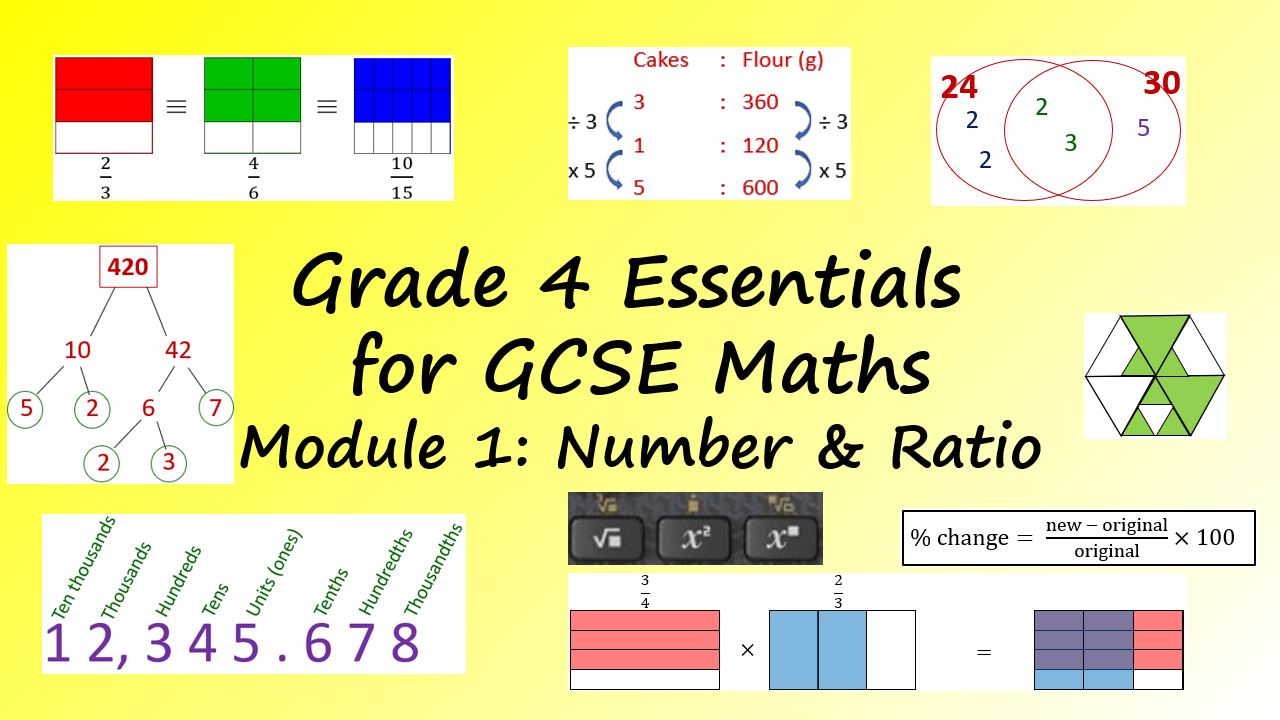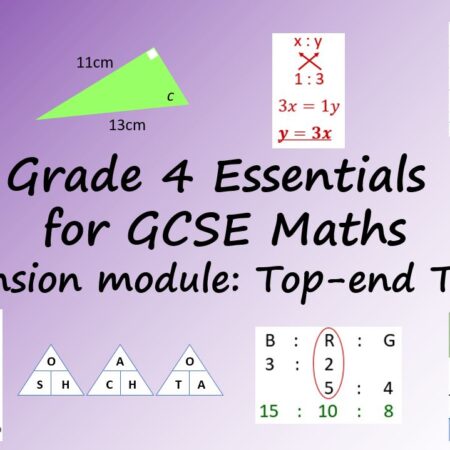Do you want to know
what you need to know
to pass Maths at GCSE or Edexcel IGCSE?
You’re in the right place!
Grade 4 Essentials for GCSE Maths will boost your confidence and understanding, and leave you feeling ready for just about anything that the Foundation GCSE can throw at you!
It’s ideal for home educators, adult learners, and anyone else who feels they would benefit from a bit of top-quality support to give them the best possible chance of that magic Grade 4.

It covers all the topics you need to be comfortable with, in order to be confident of getting a secure Grade 4 – possibly even a Grade 5 – in GCSE Maths.
It’s also suitable for anyone doing the Edexcel International GCSE (IGCSE), since there’s very little difference between the two qualifications at Foundation level. Where there are significant differences, these are highlighted.
The complete Grade 4 Essentials course is divided into four modules:
- Module 1: Number and Ratio (this module)
- Module 2: Geometry and Measure
- Module 3: Algebra and Graphs
- Module 4: Statistics and Probability
… and there’s also a supplementary extension module covering the few Top-end Topics that aren’t included in the main course, so that you get full coverage of the entire Foundation Tier.
There’s no obligation to do all of these; you’re welcome to just do the modules that you think will be of most benefit to you personally.
How to use this course
The modules can be completed in any order, but it’s recommended that you start off with Module 1 Section 1, and that you work through the lessons in each module in the order shown – though it’s a good idea to mix up topics and revisit them in between studying different areas (this is called interleaving). You can revisit each lesson as many times as you like.
You can watch the introduction and the first six video lessons – that’s over an hour’s worth – as a free preview of the course. Just click on the Curriculum tab to see it. (If you’re on mobile then it’s the little cube on the middle tab above this box.) I hope you’ll find them useful enough to want to subscribe for the rest of it too!
Each module consists of three sections, and in each section there are:
- multiple video lessons (averaging over 6 hours per module)
- supporting handouts that you can print out (though you can manage without most of them if you don’t have access to a printer)
- quizzes for you to check your understanding
- links to free online resources that you can use for additional practice.
The video lessons include lots of opportunities to practise the skills being taught. To make the most of each lesson you should pause the video when prompted, and try to answer any questions that have been set, before you continue watching to see the solutions. If you’re not able to do the questions straight away then don’t worry, but try to reveal the solutions just a bit at a time, then pause again and make some progress on your own before revealing the next bit. So although the running time of each video is usually between 5 and 15 minutes, if you use them properly then they’ll take you considerably longer.
Once you’ve completed all the lessons, you qualify for a completion certificate, which you can download for free. Since the aim is to build your confidence and skills rather than to hit an arbitrary number of correct answers, completion only requires you to work through all the lessons, not to achieve a particular score on the quizzes. The quizzes are more of a tool for you to check how well you’ve understood and remembered the material.
If you’re confident that you don’t need some of the lessons then have a go at the relevant quizzes first. If you get the questions for those lessons right then you can probably get away with skipping them (though you may miss out on some useful nuggets of information), but if you don’t then it’s definitely worth working through the lessons.
Of course, you will also need to practise exam questions. This course series focuses more on the underlying skills. There are great – and free – collections of exam questions by topic, with solutions, available from Maths4Everyone, SaveMyExams and JustMaths, as well as complete past papers on various sites. For GCSE you don’t just need to stick to your own exam board; questions from all boards are worth doing.
Constructive feedback is always welcome… and, for a limited period, if you like one module enough to leave a 5-star review then I’ll give you a code to get another module FREE!
Course Features
- Lectures 44
- Quizzes 10
- Duration Lifetime access
- Skill level All levels
- Language English
- Students 302
- Certificate Yes
- Assessments Yes
-
Section N1: Number basics and indices
- Section N1: Introduction, printable handouts and other resources
- N1a: Key terms, number types and properties
- N1b: Rules of divisibility
- N1c: Four operations with integers
- N1d: Place value, ordering and powers of 10
- Quiz: lessons N1a-d
- N1e: Directed (positive and negative) numbers
- N1f: Order of operations (BIDMAS/GEMA)
- N1g: Multiplying and dividing with decimals
- N1h: Deductions from known results
- N1i: Using a calculator
- Quiz: lessons N1e-i
- N1j: Rounding
- N1k: Bounds, error intervals, truncation
- N1l: Using 1 significant figure to estimate calculations
- N1m: Factors, multiples, HCF, LCM
- Quiz: lessons N1j-m
- N1n: Indices
- N1o: Standard form
- Quiz: lessons N1n-o
-
Section N2: Fractions, decimals and percentages
- Section N2: Introduction and printable handouts
- N2a Shaded fraction of a shape
- N2b Finding a fraction of an amount, and increasing/decreasing by a fraction
- N2c Equivalent fractions
- N2d One quantity as a fraction of another
- N2e Improper fractions and mixed numbers
- Quiz: lessons N2a-e
- N2f Adding and subtracting fractions
- N2g Multiplying fractions
- N2h Dividing by a fraction, and reciprocals
- Quiz: lessons N2f-h
- N2i Fraction/decimal/percentage conversions and equivalents
- N2j Problems with mixed fractions, decimals and percentages
- Quiz: lessons N2i-j
- N2k Finding a simple percentage of an amount
- N2l Expressing one quantity as a percentage of another
- N2m Increasing/decreasing an amount by a percentage
- N2n Simple interest
- N2o Finding percentage profit / change / error
- N2p Using a multiplier
- N2q Reverse percentages (finding the original amount)
- Quiz: lessons N2k-q
-
Section N3: Ratio and proportion
- Section N3: Introduction and printable handouts
- N3a Ratios and fractions
- N3b Sharing an amount in a ratio
- N3d Manipulating ratios
- N3e Map scales
- Quiz: lessons N3a to e
- N3f Understanding and using proportion
- N3g Best buys
- N3h “Fraction of a fraction” problems
- N3i Proportional reasoning problems 1
- N3j Proportional reasoning problems 2 (three variables)
- Quiz: lessons N3f-j






